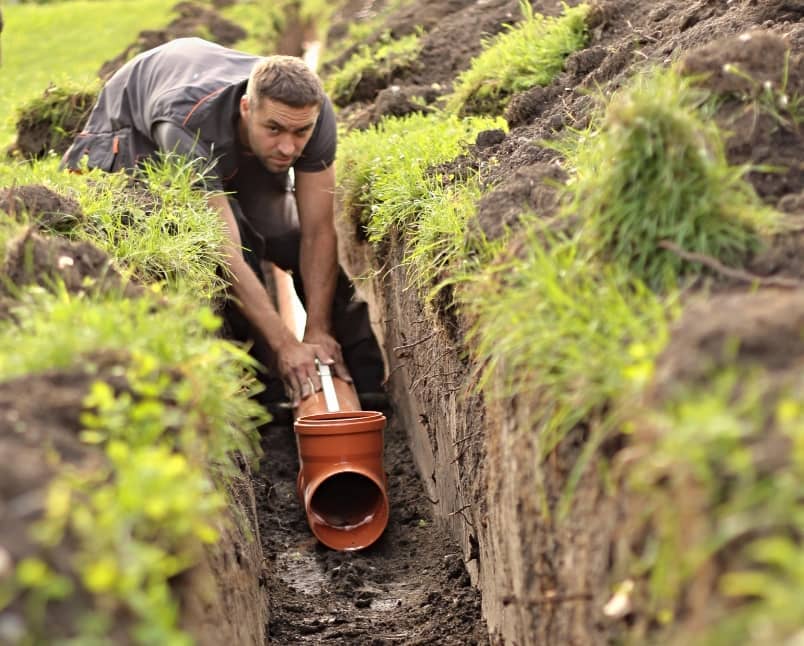Tank Installation
Get My FREE Quote!
WE DO FACETIME ESTIMATES!
Find Out Before You Buy, Facetime Estimates Available
Septic Tank Installation & Replacement
in Denver and Surrounding Cities
There are many things that homeowners and DYIers alike can do to their homes today. A septic tank is definitely not something we even the most knowledgeable DYI homeowner should tackle. Septic tanks need to be installed by a professional contractor who can ensure it is set up properly to break down organic waste from the home in the correct place and process. There are two main parts of a septic system, the tank and the drain field (often called a leech field). If a septic tank is installed incorrectly it could cost thousands of dollars in repairs and damage to your property. It is best to leave septic tank installation to the highly trained person so you can have peace of mind and keep money in your pocket.
How Much Does It Cost To Have A Septic Tank Installed?
When having a septic tank installed the first thing to take into consideration is the size of the home. For our purposes, we will look at the cost of the average 3 bedroom home in Colorado. There are many factors and pieces to installing a septic tank the right way and each is equally important. To install a septic tank properly there needs to be good soil and a level site. Another part to consider is the type of tank needs to be chosen whether it is concrete, metal, fiberglass, or a plastic type material. Additional more technical things to consider when installing a septic system are sanitary permits, drain gravel, excavation, piping, design, and labor. When you consider all of the things that go into septic tank installation it is easy to see why the installation needs to be done right the first time by a professional. With all of these things in mind, the expected cost for septic tank installation depends upon the scope of the project.
How Do I Know If I Need To Replace My Septic Tank?
Your nose can tell you when it’s time to replace your septic tank, but wouldn’t you rather know before you notice a sickening stench? Septic tanks do give some rather subtle signs of needing replacement. Recognizing the signs can save you time, money and some very unpleasant homeowner experiences.
Does The Grass And Vegetation Around Your Septic Tank Look Green And Lush?
If you answer yes, then chances are good that the contents of your septic tank are seeping into the ground. Human waste is, after all, an excellent fertilizer.
Are There Puddles Around The Septic Tank?
We don’t mean puddles from a recent rain. If you notice standing water around your septic tank, the tank is not draining into the leaching material and backing up. Avoid the water at all costs, and call a sewer system specialist at Simply Sewers.
Are Your Drains And Toilets Running Slow Or Backing Up?
Slow drains and backups inside your house can be a sign of problems anywhere along the sewer system, including your septic tank. Don’t call a regular plumber. You need someone who specializes in sewer systems and can properly fix the problem the first time.
Choosing The Right Septic Tank For Your Home
Sizes And Types Of Residential Septic Tanks
Your septic tank needs to be sized for your home. Standard sizes range from 750 gallons to 1,500 gallons. In general, septic tanks are selected based on the maximum number of people that are expected to occupy the home based on the number of bedrooms.
-
4 people to a 2-bedroom home
-
6 people to a 3-bedroom home
-
8 people to a 4-bedroom home
If your home has a properly sized septic tank, the tank should manage waste from
- Laundry room
- Kitchen, including garbage disposal
- Bathrooms
The septic tank is not designed to manage waste water from water softening systems and drainage from the roof or footing.
Another consideration for septic tank replacement is the type of septic tank for your home.
- Concrete septic tanks are one of the most durable options. The reliability of these tanks, though, relies heavily on the quality of the concrete and proper forming of the tank. Cracks are common, even with high-quality concrete tanks.
- Believe it or not, steel septic is on the low end of durability when it comes to septic tanks. The life expectancy of a steel tank is up to 25 years, but many fail sooner due to rust.
- Plastic septic tanks do not crack like steel and concrete septic tanks. Plastic does weigh less, though, so these tanks can be damaged by the weight of surrounding soil and structures.
- For a high-efficiency septic tank, we recommend an aerobic septic tank. The tanks use electricity and generate higher levels of oxygen inside the tank to expedite waste processing. Although more efficient, aerobic tanks do require more maintenance than other types of tanks.
Why Choose Simply Sewers
Working with a full-service plumbing repair company like Simply Sewers allows homeowners to hire experts who have the experience to handle a wide range of plumbing issues in their homes, including frozen pipes, replacing tubes, and handling leaks.
Simply Sewers is familiar with the sewer line services and plumbing nuances affecting residential and commercial properties in Littleton, Colorado, and metropolitan Denver, offering expert plumbing repair services within 24 hours.
The company offers competitive pricing, free estimates, and background-checked plumbing technicians who have the expertise to provide necessary plumbing services to local customers in the Denver, Colorado area.
Customers can contact Simply Sewers online through sending an e-mail to info@simplysewersdenver.com, or calling their telephone number at (720) 434-4106. Customers can also schedule an appointment for plumbing repair, clogged drain inspection, FaceTime estimates, or sewer repair services through the company’s online scheduling page.

Why Do Our Customers Trust Us?
Frequently Asked Questions about Septic Tank Installation in Denver and Surrounding Cities
How much does it cost to have a septic tank installed?
When having a septic tank installed the first thing to take into consideration is the size of the home. For our purposes, we will look at the cost of the average 3 bedroom home in Colorado. There are many factors and pieces to installing a septic tank the right way and each is equally important. To install a septic tank properly there needs to be good soil and a level site. Another part to consider is the type of tank needs to be chosen whether it is concrete, metal, fiberglass, or a plastic type material. Additional more technical things to consider when installing a septic system are sanitary permits, drain gravel, excavation, piping, design, and labor. When you consider all of the things that go into septic tank installation it is easy to see why the installation needs to be done right the first time by a professional. With all of these things in mind, the expected cost for septic tank will depend upon the scope of the project.
How do I know if I need to replace my septic tank?
Your nose can tell you when it’s time to replace your septic tank, but wouldn’t you rather know before you notice a sickening stench? Septic tanks do give some rather subtle signs of needing replacement. Recognizing the signs can save you time, money and some very unpleasant homeowner experiences.
Does the grass and vegetation around your septic tank look green and lush?
If you answer yes, then chances are good that the contents of your septic tank are seeping into the ground. Human waste is, after all, an excellent fertilizer.
Are there puddles around the septic tank?
We don’t mean puddles from a recent rain. If you notice standing water around your septic tank, the tank is not draining into the leaching material and backing up. Avoid the water at all costs, and call a sewer system specialist at Simply Sewers.
Are your drains and toilets running slow or backing up?
Slow drains and backups inside your house can be a sign of problems anywhere along the sewer system, including your septic tank. Don’t call a regular plumber. You need someone who specializes in sewer systems and can properly fix the problem the first time.




